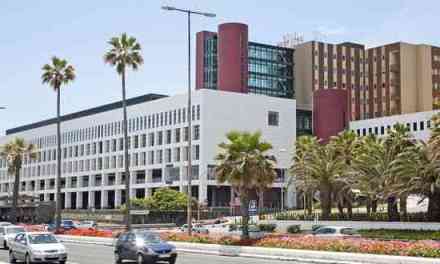 Spain’s Minister for Industry, Commerce and Tourism, Reyes Maroto, has, this weekend, made clear that British tourism to Spain will not be the first to return nor encouraged until the UK situation improves. For now she is expecting German and Nordic tourism to tentatively begin to return from mid-June, with careful monitoring and gradual adaptation to help ensure the safety of visitors. The Canary Islands, and the Balearics, are likely to be among the first to see some sort of return for international travellers over the next couple of months.
Spain’s Minister for Industry, Commerce and Tourism, Reyes Maroto, has, this weekend, made clear that British tourism to Spain will not be the first to return nor encouraged until the UK situation improves. For now she is expecting German and Nordic tourism to tentatively begin to return from mid-June, with careful monitoring and gradual adaptation to help ensure the safety of visitors. The Canary Islands, and the Balearics, are likely to be among the first to see some sort of return for international travellers over the next couple of months.
The Spanish Government is working on “safe corridor” projects to enable some Spanish regions to begin to receive foreign tourists. Initially The Canary Islands and The Balearic Islands are expected to start seeing, possibly, German and Scandinavian visitors start to return from the second half of June, though of course 14-day quarantine rules will still apply until at least July 1, this project would be a step prior to re-opening the borders, closed under the State of Emergency to international tourism. Details of the plans were unveiled by Spain’s Minister for Industry, Commerce and Tourism, Reyes Maroto, in an interview with Spanish news agency Efe at the weekend.
“The islands have offered to create these corridors,” explained Maroto, who added that she is working with other regions that will also be interested in “being able to define which corridors and with what guarantees” tourist destinations may start to operate once more after three months of total inactivity.
The first tourists to return are unlikely to be British
Foreign Minister, Arancha González Laya, said in a radio interview last week “We do not exclude the possibility of opening asymmetrically, [just] as de-escalation is asymmetric,” he explained, saying that the Spanish Government wants to agree on the criteria with European partners to allow re-opening to tourists in a secure manner.
“One could imagine an asymmetric opening of mobility within the Schengen area, but what is important is the criteria, defining what conditions are considered safe,” said González Laya. In his opinion, these conditions must be agreed between the member states, because if each country decides its own criteria, it will probably become “an exercise in discrimination and the Schengen area will be fragmented.”
Maroto explained this weekend that the government is working with “quite a few markets”, saying that Germany (the second largest tourism market for Spain) and Scandinavian countries currently stand out, as they “are in a very good [epidemiological] situation.”
She continues by pointing out how “very important” it is that the first tourists to return to Spain “are in the same epidemiological situation as us,” and stressed that they must “be able to fly safely.”
As for British tourists, from throughout the United Kingdom, which accounts for the largest annual numbers of visitors every year to Spain, Maroto points out that, although there are talks with tour operators like TUI and Jet2holidays, the pandemic data in Great Britain still “has to improve”.
In fact, the British authorities themselves, the country with the most infections and deaths from the pandemic in all Europe, still are not recommending any sort of foreign travel, so tour operators are not ready to work yet, explained the minister.
Greece and Italy have both made similar statements suggesting that British tourists should stay away for now until we see an improvement in the number of infections.
“Going faster does not mean being first”
Maroto stressed that we must “recover the repositioning of the Spain brand” and “also stimulate international travellers to visit us again. And that will be a gradual process.”
She added “we are encouraged” because we are beginning to see a “significant” increase in national and international reservations.
As for other countries that may open their borders earlier, she emphasised that “going faster does not mean being first”, while stressing that the Government wants to guarantee “safe destinations”, both for the visitor and the resident.
The Spanish tourism sector plans to compete using its “strengths”, including how well the health system has coped with the corona virus crisis, “it has withstood this pandemic and is going to be strengthened” saying that this will “be a pillar” with which to support the recovery of tourism.
Maroto added that over the coming days a plan will be presented aimed at reactivating Spanish domestic tourism, in anticipation of positive progress in dealing with the epidemic, which will allow more Spaniards to move between provinces.
For his part Spain’s Foreign Minister, Arancha González Laya, advocates, at a European level, the development of protocols at borders to allow arrivals from inside and outside the EU to be “as common as possible and the result of joint elaboration” among EU member states. He has said that the most useful thing would be for the European Commission and the EU’s Centre for the Control of Epidemics to develop a methodology that can determine if a territory is safe, and not to leave it for each country to have its own definition, because that would mean the fragmenting of mobility in Europe. It is about having “clear rules that everyone understands and that citizens can comply with,” he concluded.
EU funds for The Canary Islands and Balearics
The minister has also said that Spain will request funds from the European Union (EU) recovery plan for important sectors such as the automotive and tourism industries, with specific focus on the Canary Islands and the Balearic Islands, which depend to a greater extent than other destinations on air connectivity.
She said it is precisely because of the delicate situation with the airlines that Spain will continue to demand a European rescue plan, because the aviation and aeronautics industry have to become a “fortress” for Europe, to help us to get out of the crisis, it must have greater investment. Moroto finished by saying she hopes for “a positive response” from the EU.
 Meanwhile, perhaps, confusing messages, from some low-cost airlines, have already been appearing, with the likes of Ryanair, who earlier this year abandoned their bases in The Canary Islands, starting to publish statements encouraging people to book once more from July 1st, suggesting 1000 flights a day with prices as little as €39.99
Meanwhile, perhaps, confusing messages, from some low-cost airlines, have already been appearing, with the likes of Ryanair, who earlier this year abandoned their bases in The Canary Islands, starting to publish statements encouraging people to book once more from July 1st, suggesting 1000 flights a day with prices as little as €39.99
It is probably fair to say that nowhere near this sort of number of flights are currently planned for Gran Canaria or The Canary Islands, nor is it likely that UK visitors will be able to make the more than 2,800km journey at these suggested prices. It remains in question as to whether visitors from the British Isles will be able to start visiting once more from July 1st, though of course Irish tourism to the archipelago is expected to return a little more quickly than visits from countries outside the EU.

Promotional images from Ryanair website












